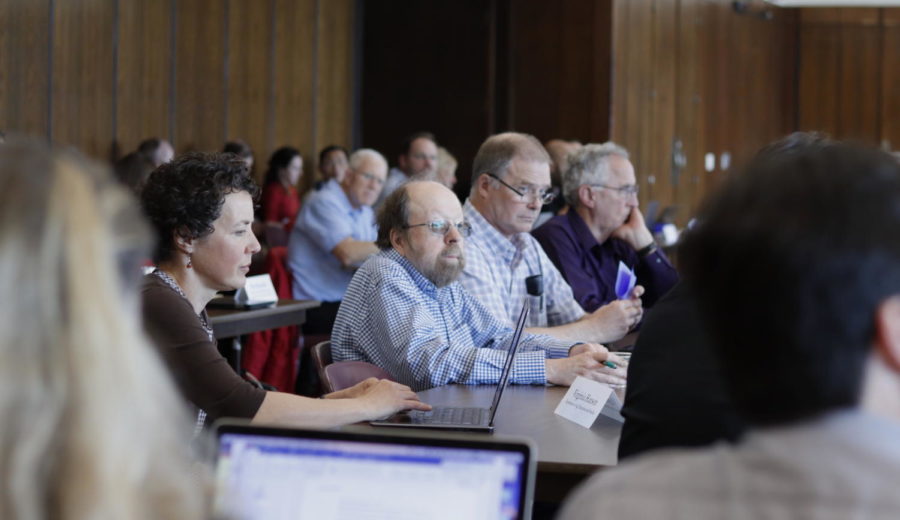Iowa State Faculty Senate meets to discuss current and new academic programs
Iowa State’s Faculty Senate hosted a meeting April 23, 2019, in the Sun Room of the Memorial Union. Senate members discussed a Workday update, annual promotions and tenure reports.
November 11, 2020
Iowa State’s Faculty Senate discussed the future of some majors and areas of study that affect both undergraduate and graduate programs.
One task was the creation of a new Master of Science degree in artificial intelligence. The proposal for the degree was passed and finalized during the meeting.
After a discussion, the Senate decided the master’s and graduate programs in the biorenewable resources and technology field would be discontinued. When discussing the future of this field and if it should be suspended, some of the senators mentioned specific downfalls of this major, such as low student enrollment, lack of federal funding and resources and the resources management model. However, it doesn’t mean this program is completely gone. Biorenewable resources and technology shares a lot of similar aspects with other degrees at Iowa State.
“The graduate students are just getting degrees in biosystems and engineering,” said Sen. Steve Freeman, professor of agricultural and biosystems engineering. “I am assuming the same thing is true with chemical engineering. So it’s not that the work is going away, it’s just going within different majors.”
One of the first new ideas to be discussed was the creation of an ethics minor, as well as the proposal for a beverage management minor and renaming the child, adult and family services major. No comments or objections to these ideas were raised at this meeting.
The Senate also passed a reform to how students who graduate with distinction are calculated. The system used now calculates distinction based on a student’s GPA the semester before they graduate. The new proposal suggests using the students’ final GPA as the determining factor if they graduate with distinction.
“Additionally, it adjusts the language as to who qualifies for graduation with distinction,” said Sen. Sarah Bennett-George, associate teaching professor of apparel, events and hospitality management. “Students in programs with a smaller number of credits taken at Iowa State, for example, the Bachelor of Nursing program, wouldn’t be eligible to graduate with distinction based on the credits they would earn here versus their associate’s degree. So this provides a path for students who have those degrees to graduate with distinction.”
Student Government President Morgan Fritz addressed ways to help students stay engaged with their online classes. She suggested a little quiz in order to make sure students actually watch the lectures and are keeping up with their work. According to Fritz, online school is creating more of a cram culture rather than students actually learning the content.
The meeting ended with a discussion about professional and scientific job classification and compensation review. The Professional and Scientific Council is a representative body that identifies the needs of constituents and provides information and responses to those needs.
Unlike the other ideas and discussions during this meeting, there was no real solution or idea to present — it was just an expression of thought.
“However, the implementation of and how this process was played out, and I think many of you supervising staff feel this way also, left a lot of questions,” said Sen. Eliot Winer, professor of the Virtual Reality Applications Center. “It left many staff members feeling significantly demeaned and unsupported by Iowa State, and in many cases, our staff members have worked 10, 15, 20, even 30 years. I even had a comment, not someone from my staff but from another, saying, ‘I worked here for 30 years and I never knew the university didn’t care about me this much.’”







